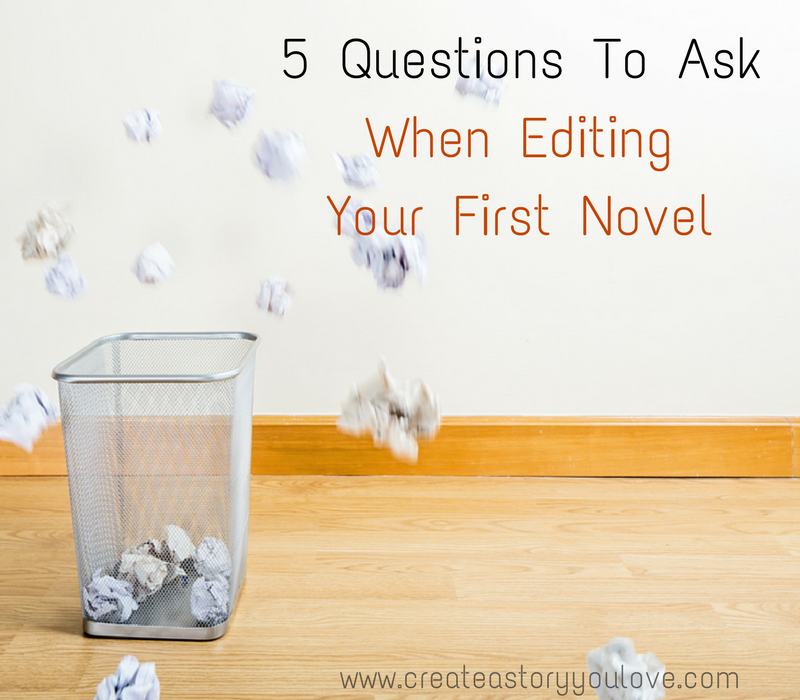Writing a novel, takes a ton of focus.
As storytellers and even more so as readers, we think we have soaked up what we need to know about how a story works. But to our surprise, there is so much to learn.

Writing and Editing Your First Story…
After you’ve finished writing your first draft(if you need help finishing your book this post might help), you feel like dancing and throwing a party. You’ve written the end, and now you’re ready to publish your book.
But it’s not quite ready yet. After you’ve written your first draft, it’s time to get to the critical second step: editing.
After just finishing up the edits for my second novel in my Historical Romance series – Anchoring Annaveta – I dealt with some common problem areas that I remembered fixing in my first novel.
Here are some questions to ask yourself when you’re editing your first fiction book, to help you make your book the best it can be.
1. Do you have intriguing characters?
It’s frustrating to read about a character in a novel, who doesn’t have any depth. As readers, we are drawn to characters that have an interesting inner life – we want to feel and empathize with their life. As readers we want that deeper understanding whether the character is good or bad.
A great way to dig deeper into who your character really is – and what drives them to act this way – is to write their backstory.
You can do this in a separate blank document, or you can add it to your story and then take out the extra sections of backstory as needed.
Write down where they come from, what they’ve gone through in their life, what is their deep passion or what they’re most afraid of, along with their quirks and any other details of their life.
You can even think of it as writing their history – write the backstory as if you were writing about the history of your family. Write about details about their relatives, along with defining moments in their life and what they like and dislike.
Even though much of your backstory might not get written down in your story, the intimate understanding you have of your characters will find it’s way into the story – even in subtle ways – possibly without you noticing it. The readers of your books will notice and will be drawn even more into your stories.
2. Do you have enough tension and conflict?
All stories must have some sort of tension or conflict. It’s what keeps readers turning the pages.
It’s important as an author to really understand the central conflict of your story and the main character arc. Each of these subtle changes in your story – the tension – should keep building gradually through every scene you write.
My big mistake with my first novel, was that after the first draft, each chapter was little more than a catalogue of events. I needed to go back and rewrite so that there was more tension, conflict and character arc to keep the reader turning the pages.
As I learned from story structure guru, Larry Brooks, conflict is what drives your story.
3. Is your language too showy?
As writers of fiction we want to get rid of unnecessary words. If our words or phrases are too full of beautiful prose, sometimes that one sentence or paragraph can stand out and disrupts the flow of your story.
Sometimes using extra words or overusing descriptions can put a choke hold on the narrative and make it more difficult for readers to understand what a certain sentence means. And if the flow of your story is interrupted, then the reader is taken out of the fictive dream – story flow – and they might not read your novel all the way to the end.
4. Do you have someone else read your story?
Each fiction writer should self-edit their stories. Read through your manuscript until you feel like you’ve done all you can to make it your best.
Then, it’s time to give your story to a professional editor and ask some beta readers to give you tips on how you can make your story better.
What often happens, is that our stories are so familiar to us, that we miss some mistakes or flaws that someone else will catch. This just happened to me as I was in the editing stage. I thought I had the characters and the research all figured out, but my editor did such a good job that she caught many errors in either names of people or even a few sentences that were unfinished(ack!).
Needless to say, having a beta reader or professional editor look through your story can really help. It’s their first time reading through your story and many times they’ll catch a bunch of details you missed.
5. Ask Yourself ‘How is My Story Unique?’
In each genre, there are specific expectations that readers have for that genre. For example, in a romance novel it is expected that the hero and heroine fall in love and that there’s a happy ending.
Make your story unique from other novels in your chosen genre.
Ask yourself how the story you’re writing is different from other fiction. Even though certain tropes are expected in your genre, you still need to surprise and delight your reader.
… and readers are excited to read a novel that has fresh ideas from a genre they know well.
Take the time you need to write your story with your one-of-a-kind perspective.
Don’t worry about making mistakes or stress about the learning curve. Just keep writing and editing your stories. You can do this 😉
Are there other tips you have on editing your first novel? I’d love to hear your ideas in the comments.
